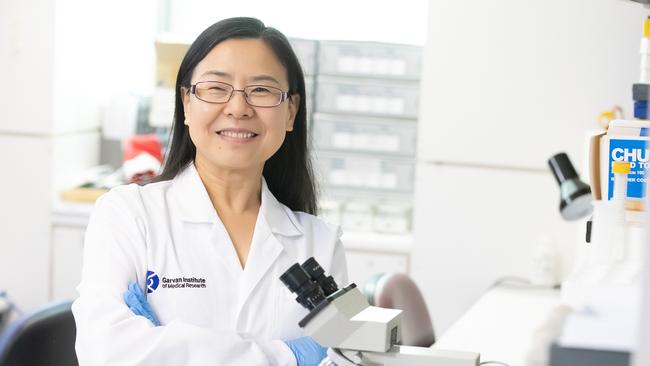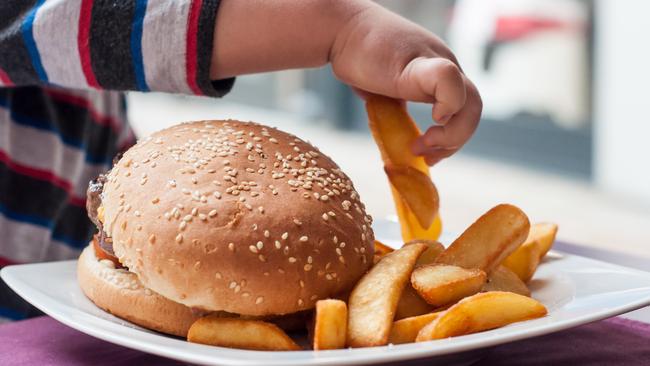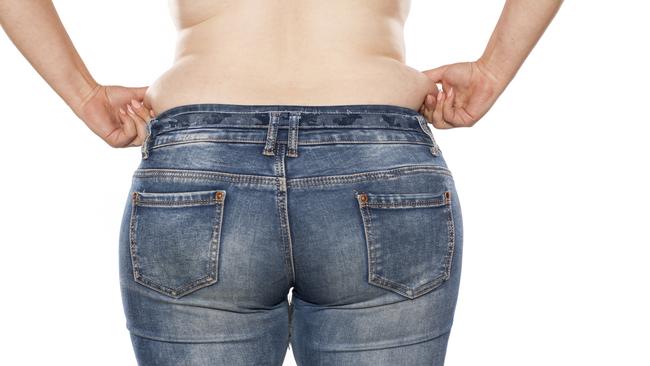The Cure: New ways Aussies can lose weight
A fat burning pill, a diet focused on protein and simply increasing your sleep – this is what the latest research into losing weight shows.
National
Don't miss out on the headlines from National. Followed categories will be added to My News.
Exclusive: Obesity is one of Australia’s greatest health threats, causing an estimated 4000 cancer cases a year and costing the health system and economy nearly $12 billion.
Two in three Australian adults and one in four kids are overweight or obese and its not only putting us at high risk of cancer, but also heart disease and other chronic conditions like Type 2 diabetes.
Here, medical correspondent SUE DUNLEVY spotlights new research into what is making us fat and how to beat the condition.
FAT BURNING PILL
It’s the holy grail of weight loss – switching the process that stores fat into one that burns fat and Garvan Institute researchers believe they are on the cusp of making it happen.
They have identified a receptor, called Y1, that promotes fat storage and stops fat being burned and used as body heat.
Using an experimental drug called BIBO3304 to block this receptor they turned energy-storing fat into energy-burning fat.
Mice given the drug lost 36 per cent of their body weight and 27 per cent of their fat mass even though they were eating a high-fat diet.
Associate Professor Yanchuan Shi also tested the drug on human fat cells in a laboratory dish and received a similar result.
“That’s what really got us excited about the results … potentially it can also work in the same way in humans,” she said.

POWER OF PROTEIN
Eat enough protein and you will eat less food, according to Sydney University researcher Professor Stephen Simpson.
His research shows humans have separate appetite systems for different nutrients and the protein appetite is “a very powerful driver of how much we eat and we think one of the keys to understanding the global obesity epidemic”.
The modern diet is based on eating protein decoys — foods like potato chips that taste like protein but are just fat and carbs.
“The fibre has been stripped out and if you put in fat plus sugar plus a little bit of salt you hit the bliss point which is essentially unknown in natural foods,” Prof. Simpson said.
“Our biology is being subverted by that and we’re diluting protein in our diet, as a result being driven to eat excess calories and everything has flowed from that.
“Until you’ve eaten your target protein intake, and that target changes across the life course, the more prone you are to having to eat excess calories on a junk food diet.”

Our protein needs shift over our lifetime. It is at about 7 per cent when you’re an infant, jumps to 15 per cent when you’re an adolescent and then to about 20 per cent if you’re a young adult in pregnancy or a young adult who’s building a lot of muscle.
As we age the amount of protein we need starts to drop. People in their late thirties to fifties need around 12-15 per cent protein.
But by the time of menopause for women and age 60 for men, the protein intake needs to increase again to around 20 per cent.
Prof. Simpson said it might be advisable to eat protein earlier in the day.
OBESITY GENE
A gene that regulates the storage of dangerous fat and prevents it from becoming toxic — and causing diabetes and heart disease — has been discovered and could revolutionise weight management.
Scientists at the Baker Heart and Diabetes Institute have found removing the gene TRIM28 meant that fat was more likely to be stored safely in buttock and thighs than around the heart, liver and muscles which might lead to diabetes, heart disease, fatty liver disease and cancer.
“For cardiovascular disease, we’ve known for a long time if you have fat around your belly, for example, that there’s much higher risk of you getting diabetes or heart disease,” Professor Brian Drew said.
His team is now working to see whether they can produce a drug that would block the gene and it could be given to people who had difficulty clearing fat from their bellies even with diet and exercise.

APPETITE CONTROLLING DRUGS
Endocrinologists are achieving amazing weight reduction in obese patients using new appetite-controlling diabetes medications, like Ozempic and Contrave, in combination with reduced carbohydrate and fasting diets.
Sydney endocrinologist Dr Flavia Bueno said researchers now understand that obesity is not just the result of poor lifestyle choice but a disease of metabolism regulation — some patients are genetically determined to eat more than others.
One of the largest weight loss programs in Australia being run in Sydney is mixing lifestyle, surgical weight loss and diabetic medications.
Endocrinologist Dr Ramy Bishay, who runs the program in Blacktown in the city’s west, said the drugs used are naturally occurring hormones the body produces to promote fullness after eating, leading to reduced food intake.
Used in isolation the drugs can help people shed eight to 12 per cent of their body weight but when used in with an intensive lifestyle program including a physical activity prescription the average weight loss doubles to between 15 to 20 per cent.
Side effects include nausea and vomiting if you eat a high-fat meal but this reduces over time.
He recommends people use the treatments for two to three years even after achieving their weight loss goal because the body will fight to get back to its original weight.
EATING WHOLE FOODS
Dietitian Rosemary Stanton, who helped develop Australia’s national nutrition guidelines, said our obesity epidemic is caused by a diet that is two thirds ultra-processed food that is high in carbohydrate and fat and not filling.
Eating unprocessed whole foods solves the problem.
“You are never going to eat too many apples because you get sick of chewing and you’ll be on the toilet the whole time, but if you turn them into juice you’ll consume all the calories in five apples in about 30 seconds,” she said.
SLEEP TO LOSE WEIGHT
Losing weight could be as simple as getting more sleep.
University Chicago researchers found overweight people who received sleep counselling ate 270 fewer calories each day and slept for and extra hour a day.
People could lose 12 kilograms over three years just by getting more sleep, they predict.
They speculate the weight loss is due to the fact that when you sleep more there is less time to eat and sleep may also affect hormones that regulate appetite.

HOW LYNDAL SHED 36KG
The science of weight loss fascinates Lyndal Wimalasekera who shed more than 36 kilos last year — without vigorous exercise.
Diagnosed with rheumatoid arthritis at age 18, she had long found physical activity painful.
And by age 36, the onset of early menopause — a direct result of her arthritis — and multiple miscarriages, led her to comfort food.
By late 2020 her emotional eating saw her tip the scales at more than 113 kilos.
“I tried Easy Slim back in the day, I’ve tried vigorous exercise, which of course didn’t work with my arthritis, I’ve tried Paleo, Keto, Thai Soup diet, the Lemon diet and intermittent fasting,” she said.
Ultimately it was a second go at Weight Watchers which cut through.

The community sharing of ideas and the classes which explained the science of weight loss made the difference, she said.
“Every week you learn new information, something to put in your, I’m going to call it my health backpack, where I know now, this is information that’s come from scientists, and it’s proven to work and it has worked,” she said.
Both she and her husband are very proud she has managed to maintain her weight loss for more than a year — for the first time in her life — not by denying herself any food but by controlling the portions she eats.
More Coverage
Originally published as The Cure: New ways Aussies can lose weight





